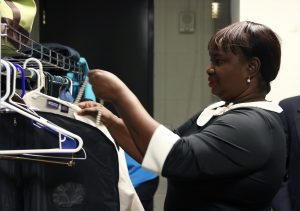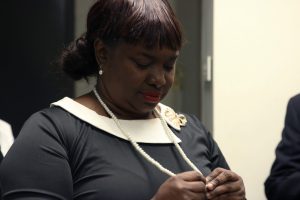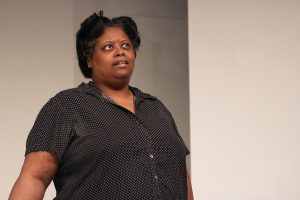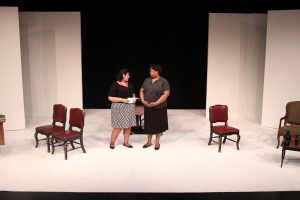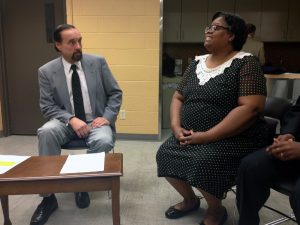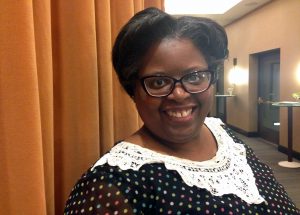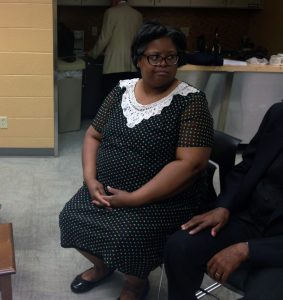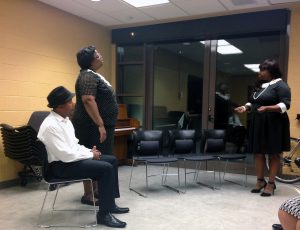- Slug: Arizona playwright. About 1,740 words.
- Photos, audio clips available (captions and thumbnails below)
By SAUNDRA WILSON
Cronkite News
PHOENIX – Larissa Brewington channels a black woman from seven decades back, demure in a black polka-dotted dress with a doily collar and cat-eye glasses perched on her nose, convincing her way into a whites-only Oklahoma law school in 1940s’ America.
Scene. It’s 1946, outside the university president’s office.
“Can you imagine, colored people crossing the campus of the University of Oklahoma? We’ll cause chaos before we actually have the chance to cause chaos,” she says, sparking local NAACP leader Roscoe Dunjee’s concern that Ada Fisher might be too hotheaded for the difficult task ahead.
“We won’t have to imagine. This is going to happen, Ada Lois. Should you be chosen, are you ready for the fight?” he asks, concern lacing his words.
“Sir, as my mama said, she didn’t raise any breakable people,” Fisher responds playfully, yet knowingly.
They walk towards the office of the University of Oklahoma president.
End scene.
The woman Brewington embodies is Ada Lois Sipuel Fisher, who desegregated the University of Oklahoma College of Law in 1949 after a three-year battle that went to the Supreme Court.
The words Fisher and Dunjee utter flow from Brewington’s brain. Brewington, 71 years after history was made in Oklahoma, is a rarity herself, a quadruple-hypenate as an African-American female playwright and actress in Arizona.
Her latest play, A Legacy of Justice, which opened this week at the Herberger Theater in downtown Phoenix, continues a tradition of opening her plays during Black History Month. She is writer and lead actress. Mastermind and star.
Brewington, 45, resurrects history through theater, bringing overlooked stories to a modern audience in Arizona. She spends months researching historical characters like Harriet Tubman, drawing from her home library of more than 1,000 books.
“I can throw a shoe into that room and hit a book with hundreds of stories about obscure black people,” Brewington said. “It’s the stuff that just needs to be heard and seen.”
Resurrecting Black History in Twenty-First Century America
Brewington said she believes a knowledge of history is important. She is a history-lover, spending hours researching online and reading biographies. This passion drives the historical content of her shows.
“Modern stuff is fantastic,” she said. “I think we could do without the slave narratives, but the historical stuff about educated people and people who change the world is important because it spurns people to look for more of the light.”
She also intentionally chooses female protagonists because she feels that many women have been written out of mainstream history.
When she first began writing, she didn’t intend to write about a black man because, in her words, men get more attention than women in black history.
These days, however, she’s open to harmonizing more men into her stories, such as a show she wrote about activists and writers Ida B. Wells and Frederick Douglass.
Brewington said she has written four full-length stage plays, 18 one-act plays, and five ten-minute performances.
She said her shows have been performed through Space 55, the Arizona Women’s Theater and have been highlighted for 12 years as a part of the Lunch Time Theater at the Herberger Center.
Many of Brewington’s plays center around family relationships and human interaction including several productions highlighting the mother-daughter bond. Others explore darker themes, such as Spirit, a ten-minute play set in a graveyard that explores the afterlife from the voice of three spirits.
But, writing plays about black history holds a special meaning.
“There’s just a ridiculous amount to write about out there and learning about my own history has been really really fantastic and expansive,” Brewington said.
Brewington has discovered history close to home, writing and performing a monologue about Elizabeth Hudson Smith, a black woman in Arizona who owned a hotel in Wickenburg from 1905-1935. She was one of the first African American female entrepreneurs in the state.
Since 2013, her Herberger creations have had a special place: open to audiences during Black History Month.
Arizonans connect to Brewington’s message
“Being an African American woman born here in Arizona — I mean we really don’t know a lot about our history and she brings it to the forefront for people like me and for people of other races,” said Kathy Blaze Jefferson, 43, who plays Ada Fisher’s mother in Brewington’s latest production.
“She’s doing our community justice,” Jefferson said. “This is more than just this woman out here doing stage plays.”
Mary Robinson, an arts education and outreach associate for the Herberger who has worked with Brewington for nine years with the lunch theater program, said audiences love Brewington’s stories. Most of the audience are business people and seniors, she said.
‘We’ve had several audience members who came specifically because they knew the characters, they knew the story,” Robinson said.
She said one woman came up to her after Brewington’s show last year about integrating Central High School in Little Rock, Arkansas, saying she had attended the school during those tumultuous times.
Brewington likes to connect to her audience after each play, hosting “Talk Back,” a question and answer session after a show.
“People like to fact check you,” she said. “Some people just cry.”
Sometimes, history hurts: discovering Ada Fisher’s story
Brewington often struggles to write plays, she admits. She writes constantly, in between bouts of playing Candy Crush (her score is 1,292) and working to find jobs that support her financially. (When it comes to writing plays, she’s the prototypical starving artist). She always searching for the perfect historical figure to profile.
“It’s always a surprise to come up with something new,” Brewington said. In pursuit of her latest effort, she first uncovered the story of Lloyd Gaines, an African American man who was one of the first to sue to be able to attend the University of Missouri.
But she continued her search, looking for a strong female character.
Brewington noticed the name “‘Ada” in a list online of men who fought cases to attend a higher education institution.
Staring at her computer screen after three days of panicking, she immediately printed out all the information she could find about her newfound hidden gem, Ada Fisher.
What luck, she thought.
She started writing the show the next day.
After being denied entrance to the University’s College of Law based on state laws barring African-Americans from white universities, Fisher fought the case to the Supreme Court with support from the NAACP and attorney Thurgood Marshall, who later became a U.S. Supreme Court justice.
She won her case, but the law school, rather than admit her, chose to designate another separate law school exclusively for her to attend.
The play reveals what happened next.
“I think it’s important to tell these stories because it forces people to go out and read history,” Brewington said. “A lot of times the lack of understanding as far as history is concerned will color how you understand other people.”
African American, Female, Playwright, Actress: rare in Arizona
Award-winning African American female playwrights include Lorraine Hansberry, of Raisin in the Sun, to the more contemporary Ntozake Shange and Anna Deavere Smith. Whoopi Goldberg’s one-woman Broadway show years ago inspired Brewington as a child.
Diverse theater organizations dot the Phoenix area, including the 48-year-old Black Theatre Troupe, which on Feb. 10 opens Broke-ology from playwright Nathan Louis Johnson, who also writes for TV series Resurrection and Luke Cage, about a Harlem-based superhero. Latino-based theater organizations in Arizona include Teatro Bravo and New Carpa Theater Company.
But Brewington isn’t aware of other Arizona playwrights who look like her.
“There’s not many people who do this like Larissa here in the Valley,” Jefferson said.
Brewington said that though she believes there’s a hole in Arizona when it comes to Black female playwrights, there is no shortage of talent. Brewington has submitted her work to playwriting conventions and contests at Yale University and the Arizona Women Playwrights Pandora Festival.
She admires Pulitzer Prize winning playwright and screenwriter Lynn Nottage, another black female, saying her historical material is “right up her alley.”
Brewington said she appreciates that Nottage writes about times in black history that she feels are often overlooked, including the 1940s and top of the century.
“I think a lot of it has to do with the fact that a lot of people don’t see it as an option,” Brewington said about the lack of black female playwrights in Arizona. She said she’s met black women who act and write for film, but not for the stage.
Brewington didn’t always see playwriting as an option, initially channeling her passion into acting and writing novels.
The acting came naturally, she said.
“I think I was just drawn to it because it was something that was just inside of me,” she said. “I didn’t have much control over it.”
After performing in a few school productions, Brewington said her stepfather encouraged her to audition for a one-woman show when she was 16, in Pennsylvania. She got the part.
The playwriting came from another push years later, this time, from a professional actress she was performing with in a children’s show.
Brewington said she wrote in one-woman shows starting out because it was all she knew. Her first script followed the story of an elderly woman being abused in a shelter.
She went on to write and perform a one-woman show about Harriet Tubman, the beginning of Brewington’s historical work.
More plays, more people, more history expected on journey into future
Brewington hopes to continue writing, performing and submitting her work to be produced and published.
She wants to focus on stories that include a variety of historical characters and is working on a full-length version of A Legacy of Justice.
“As many historical people as I can fit into a show is like me screaming in joy, in heaven,” Brewington said.
Cost: $6. Order lunch online with tickets or bring your own
When: Feb. 7-9 and Feb. 14-16
Time: Show at 12:10 p.m., doors open at 11:40 a.m.
Contact: www.herbergertheater.org | 602.252.8497
^__=
